By Melanie Nathan, June 23, 2014.
Today the LGBT Community in Uganda suffered a blow when the case they had brought in the Ugandan courts against the Attorney General and the Minister of Ethics and Integrity, Fr. Simon Lokodo, was dismissed with legal costs awarded against them. The case was brought after the Minister closed down a LGBT workshop at Imperial Resort Beach Hotel, Entebbe. This occurred before the new Anti-Homosexuality Act and before the so called “promotion” of homosexuality was made illegal under Uganda law. From the summary below, one can note that the old penal code’s ‘conspiring’ clause was used to endorse the minister’s assertion that the workshop was, at that time, illegal.
Here is a summary of the ruling as recorded by Fridah Mutesi, one of the lawyers for the applicants.
Introduction
Today, 23rd June 2014, the High Court delivered the long awaited ruling in the case of Jacqueline Kasha Nabagesera, Frank Mugisha, Julian Pepe Onziema, and Geoffrey Ogwaro v. The Attorney General and Hon. Rev. Fr Simon Lokodo, High Court Miscellaneous Cause No. 33 of 2012. The applicants lost on all four grounds framed by the court and the case was dismissed with costs.
Agreed facts in Court
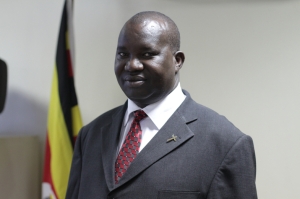
PHOTO: BY RACHEL ADAMS – pictured: Ugandan Minister for Ethics and Integrity Simon Lokodo at his office in Kampala, Uganda.
That Hon. Simon Lokodo, the second respondent who is the Minister of Ethics and integrity, on 14th February 2012 prematurely stopped a workshop which was attended by various members of the public including members of the Lesbian, Gay, Bisexual, Transgender and Intersex (LGBTI) community of Uganda, at Imperial Resort Beach Hotel, Entebbe. The meeting was scheduled to go on 16th February 2012.
Issues framed by the parties for determination
1. Whether by organising and attending the workshop at Imperial Resort Beach Hotel Entebbe from 9th to 16th February 2012 the Applicants were engaging in illegal and/or unlawful activities.
2. Whether the Applicants’ constitutional rights were unlawfully infringed by the Second Respondent when he closed down the workshop.
3. Whether the Second Respondent can be sued in his individual capacity.
4. Whether the Applicants are entitled to the remedies prayed for in the Notice of Motion.
Court Proceedings
The application was filed by way of Notice of Motion and evidence was given by way of affidavits. The applicants filed three affidavits sworn by the First, Second and Third Applicants. The respondents also filed three affidavits sworn by the second respondent, Nicholas Abola and George Oundo.
The Applicants were represented by Mr. John Francis Onyango of Onyango & Co. Advocates, and Ms. Fridah Mutesi of Human Rights Awareness and Promotion Forum (HRAPF). The respondents were represented by Ms. Patricia Mutesi from the Attorney General’s Chambers.
The parties were each asked to make oral submissions on their respective cases, which was done and judgment was reserved.
The Court’s decision
The court decided the issues raised as follows:
On Issue 1: Whether by organising and attending the workshop at Imperial Resort Beach Hotel Entebbe from 9th to 16th February 2012 the Applicants were engaging in illegal and/or unlawful activities.
The judge decided the issues in the affirmative, that the applicants by organising and attending a workshop at Imperial resort Beach Hotel Entebbe from the 9th to 16th of February 2012 were engaged in illegal/unlawful activities.
The judge relied on Section 145 of the Penal Code Act, which criminalises carnal knowledge against the order of nature together with Sections 21, and 392(f), which provide for parties to an offence. That it is a principle of the criminal law that in addition to the substantial offence, it is also prohibited to directly or indirectly encourage or assist the commission of the offence or to conspire with others to commit it, regardless of whether the substantive offence is actually committed. Therefore those persons who are engaged in activities that encourage members of the LGBTI community to engage in criminal conduct are condoning an illegality.
That the affidavits of the respondents clearly showed that the activities of the applicants were encouraging or assisting in the perpetuation of an illegality, and were therefore unlawful. Therefore, that the Minister was reasonably justified in closing the workshop as he acted in public interest, which falls, within his mandate.
1ssue 2: Whether the Applicants’ constitutional rights were unlawfully infringed by the Second Respondent when he closed down the workshop.
The judge again found for the respondents. He based on the Article 43 limitation of human rights. He further noted that the protection of morals was a legitimate reason for limiting the rights. He also relied on Articles 17, 27 and 29 of the African Charter on Human and Peoples Rights (ACHPR) to show that promotion and protection of moral values is a responsibility of the state. He further said that the criminal law could be used to restrict human rights:
He also based on Article 44 to hold that the rights cited were not non derogable and thus could be limited, as long as the limitation does not amount to political persecution.
On the specific rights, the judge decided as follows:
Freedom of Expression: He found that the right could be validly restricted in the public interest. That under Article 9 of the ACHPR, individuals have the right to express and disseminate opinions within the law. The right therefore had to be expressed within the ambit of the law. He was therefore not persuaded that closing of the workshop violated the right to freedom of expression.
The right to political participation: The judge doubted its relevance to the case but held that its exercise must be within the law. He relied on Article 3 of the UN Declaration on Human Rights Defenders which states that: “domestic law is the framework within which human rights are enjoyed and in which human rights promotion activities should be conducted.”
Freedom of Assembly: The judge agreed with counsel for the respondents that in enjoyment of right to freedom of assembly, one has a corresponding duty to act in accordance with the law. He rejected the reliance on the European Convention on Human Rights on the basis that its approach should be viewed in the context that there is no member country in the European Community which prohibit homosexual acts which reflects the moral standards in Europe. He said that this is different from the prevailing legal situation in Uganda where homosexual acts are offences against morality and their promotion (incitement, conspiracy to incite, e.t.c) is prejudicial to the public interest to allow any assembly which has an agenda of promoting such acts.
Freedom of association: The judge relied on Art. 10 of the ACHPR, which provides that, “ every individual has a right to free association provided he abides by the law. The judge held that the issue was not to freely join associations, their existence or membership but the minister based on the agenda in promoting homosexual acts which are prohibited acts and an illegality. Court noted that the recognition of homosexuals as a minority whose acts are legitimately prohibited is not a principle of law or norm generally recognized by African states, nor are homosexual acts recognized as an accepted African practice and therefore the applicants promotion of homosexual acts was an unlawful exercise of the right to association and assembly which was prejudicial to Uganda’s public interest.
Right to Equality: The judge held that equality should be within the law. He distinguished the case of Kwoyelo Thomas, where a person who qualified for amnesty had been denied amnesty without any reasonable explanation. In the present case, the difference in treatment of homosexuals was legitimate as it was in public interest under Art.43 of the Constitution on the basis of promoting an illegality.
In conclusion, on this issue, the judge noted that the High Court was not competent court to determine whether the law prohibiting homosexual acts (section 145) or their incitement, e.t.c, is justifiable or acceptable in democratic countries as this would necessitate interpretation of the Constitution. In the absence of a Constitutional interpretation, the current law must be recognised as valid and binding.
Further that the restriction of the rights only extended to the promotion of homosexual acts and there would have been no interference if the workshop had proceeded without such acts of illegality. The rights above were not jeopardised and they remain open to the applicants.
Issue 3: Whether the Second Respondent can be sued in his individual capacity.
The Minister could not be sued in his individual capacity as any suit against him can be brought within the law. His actions were not taken for his personal benefit but he acted in his official duties as a Government Minister. The 1st respondent is vicariously responsible for his actions. The suit against him was incompetent in law.
Issue 4: Whether the Applicants are entitled to the remedies prayed for in the Notice of Motion.
The judge held that, the applicants are not entitled to the remedies prayed for because in exercising their rights, they promoted homosexual acts which are prohibited by law. Thus, they cannot benefit from an illegality.
The application was dismissed with costs to the respondents
Next Steps
The Coalition has written to the Court applying for the record of the proceedings and the judgment. It is after studying the judgment that the decision on whether to appeal or not will be taken by the Legal Committee and the Steering Committee of the Coalition





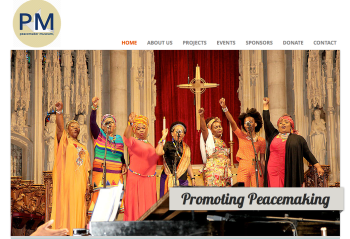




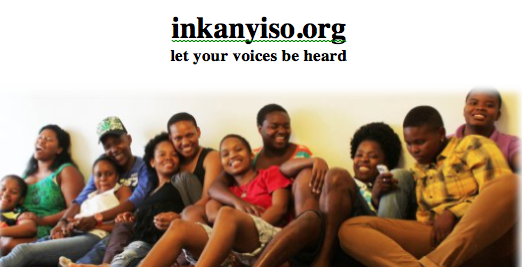







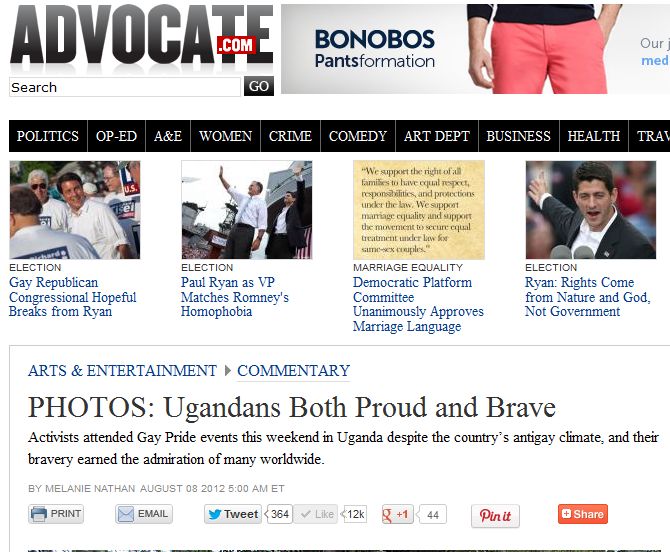
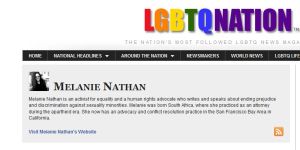
 PoochParkWear customizes hoodies and t-shirts, the good, the naughty, the in between, whether proud or quirky let them be seen. We also offer biker jackets, croc or pleather collars, a variety of collar charms, and our special Zinja beaded collars made by a co-op of HIV-positive South African women, the Sisonke women who weave the beads onto the collars.
PoochParkWear customizes hoodies and t-shirts, the good, the naughty, the in between, whether proud or quirky let them be seen. We also offer biker jackets, croc or pleather collars, a variety of collar charms, and our special Zinja beaded collars made by a co-op of HIV-positive South African women, the Sisonke women who weave the beads onto the collars.

Reblogged this on JerBear's Queer World News, Views & More From The City Different – Santa Fe, NM.
What did anyone expect from this dirty gov’t? They are as base as they can be. Ugly, hateful, & judgemental- not to mention–> frightened of their own sexual shadows, apparently.
I count myself very happy not to be there– & am so very sorry for those who are. What a sincerely grotesque group of people in that gov’t…I imagine that if every citizen who wanted to leave, actually left, only that group of horrible gov’t people would be left.
Imagine- trying to turn family & friends against each other? Really ugly. Where is the outrage from the supposed religious good people? Silent & complicate cowards, every one. Shameful.